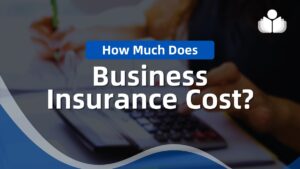Securing the proper business insurance from the beginning is crucial if you’re launching a startup. Inadequate coverage can expose your young business to risks and lawsuits that could financially cripple your growing venture.
This article will guide you through everything you need about startup business insurance and highlight the best insurance companies.
>> Try NEXT’s Business Insurance >>
Why Do Startups Need Insurance?
Startups need business insurance because they face many of the same risks as larger, more established businesses, including lawsuits, accidental injuries, theft of business property, and cyber attacks.
With business insurance, your startup can cover the costs of lawsuits and claims out of pocket, which could be financially devastating.
For instance, if an employee in your startup provides inaccurate or misleading information to a client, resulting in a financial loss, you could be sued. A comprehensive business insurance policy with errors and omissions coverage would help cover your legal costs, judgments, and settlements.
How Much Does Business Insurance Cost for Startups?
According to Insureon, the average cost of general liability insurance for a startup is $42 per month. Other types of business insurance, such as professional liability insurance, average $61 per month, while workers’ compensation insurance costs about $45 per month.
Your startup’s business insurance costs will depend on several factors, including:
- The size of your startup
- Where your startup is located
- The number of employees
- Revenue
- Types of services provided
- Claims history
- The types of coverage you buy
>> Try NEXT’s Startup Business Insurance >>
Types of Business Insurance Startups Need
A startup will likely face various risks, including injuries, lawsuits, and claims of professional mistakes. The best small business insurance policy for startups includes various coverage types to address various potential issues.
A Business Owner’s Policy (BOP) is an excellent option for your startup. A BOP combines three important coverage types and is typically more cost-effective than purchasing each separately. Here’s what’s included with a BOP.
General Liability Insurance
General liability insurance covers accidental property damage and injuries to others. For instance, if a client trips on a rug while visiting your office, your general liability insurance can pay for their medical expenses. It also covers your legal costs if you get sued for an accident.
General liability insurance protects against other issues, such as copyright infringement, reputational harm, and advertising injury.
Commercial Property Insurance
Commercial property insurance protects the physical location of your startup and business property from theft, vandalism, severe weather, and fire. It covers computers, office furniture, tools, supplies, and inventory.
Business Interruption Insurance
If your startup can’t open temporarily due to a problem covered by your policy, such as a fire, business interruption insurance covers your lost income.
It also covers other expenses, like temporarily relocating to another office. Business interruption insurance is also known as business income insurance.
Other Types of Small Business Insurance Types
While a BOP can serve as the foundation of your startup’s insurance plan, you can add additional types of small business insurance to address specific risks associated with your industry.
Here are some to consider:
Commercial Auto Insurance
If you’re driving a vehicle such as a car, truck, or van for your startup, you’ll need a commercial auto insurance policy. For instance, if you drive a car to meet with clients or use a van to transport materials and supplies, your personal car insurance policy won’t cover work-related accidents.
A commercial auto policy includes several different coverage types. Here are some common coverages:
- Bodily Injury Liability: Pays for accidental injuries you or your employees cause to others and covers your legal costs if you’re sued because of an accident.
- Property Damage Liability: Pays for accidental property damage you or your employees cause to others. For example, if you accidentally back into a client’s fence, this coverage will pay for repairs.
- Combined Single Limit (CSL): Uses a single limit for claims involving both property damage and injuries to others.
- Personal Injury Protection and Medical Payments: This policy covers medical expenses for you and your employees, regardless of who is at fault for the car accident.
- Collision Insurance: Pays to repair or replace your startup’s work vehicle if you or an employee is involved in a car crash.
- Comprehensive Insurance: This covers the cost to repair or replace your work vehicle for issues like fire, floods, falling objects, severe weather, collisions with animals, vandalism, and theft.
- Uninsured Motorist (UM)/Underinsured Motorist (UIM) Coverage: Pays for medical expenses for you and your passengers if someone without insurance or insufficient insurance crashes into your work vehicle. In some states, UIM can also cover damage to your work vehicle caused by an uninsured driver.
Commercial Umbrella Insurance
You’ll want to buy commercial umbrella insurance for additional coverage beyond your general liability insurance. This coverage activates when your general liability limits are exhausted.
For instance, if your startup is sued for $1 million and your general liability limit is $500,000, your umbrella policy would cover the remaining $500,000 shortfall.
Cyber Liability Insurance
Cyber liability insurance protects your startup from data breaches and threats involving internal data and computer systems. This data can include Social Security numbers, driver’s license numbers, account numbers, customer information, and credit card numbers.
Cyber liability insurance covers expenses such as identity recovery, data recovery, and investigative services. It can also cover costs for your business partners and customers, including customer notifications, legal fees, and settlement costs.
Directors and Officers Insurance
Directors and officers (D&O) insurance protects your startup’s directors and officers against lawsuits involving financial loss, mismanaged funds, intellectual property theft, copyright infringement, and misrepresentation of company assets. This coverage ensures that those in leadership positions are safeguarded from personal liability.
Employment Practices Liability Insurance
Employment practices liability insurance covers legal costs associated with claims of wrongful termination or violating employees’ rights. This includes the expenses for judgments and settlements.
Errors and Omissions Insurance
Errors and omissions (E&O) insurance, or professional liability insurance, covers claims of professional mistakes, even if the claim is unfounded.
For instance, if a client sues your startup over inaccurate advice that led to bankruptcy, your E&O insurance will cover your legal costs. Other covered professional mistakes include negligence, misrepresentation, and violation of good faith and fair dealing.
Workers Compensation Insurance
Workers’ compensation insurance covers workplace injuries and illnesses. It pays for medical expenses, a portion of lost income, and other costs such as physical therapy. Most states require workers’ comp, even if you have only one employee.
>> Use NEXT’s Insurance Service >>
How to Choose the Best Business Insurance for Startups
A small business insurance plan for your startup addresses the risks associated with your company and industry. For instance, if your startup has a board of directors, you’ll need directors and officers (D&O) insurance to cover lawsuits such as misrepresenting company assets.
Here are some tips for choosing the best business insurance for startups:
- Bundle Your Policies: A Business Owner’s Policy (BOP) is a solid foundation, combining three essential coverages: general liability, commercial property, and business interruption insurance. It’s usually more cost-effective than purchasing each coverage separately. You can add other coverages to your BOP to suit your startup’s needs, such as workers’ compensation and professional liability insurance.
- Compare Business Insurance Quotes: Insurance prices vary among providers, so obtain quotes from multiple insurers to find the best price for your startup’s business insurance.
- Periodically Reassess Your Startup’s Needs: Your startup’s insurance needs will change as it grows and evolves. Regularly review and update your coverage to address new risks. For example, if you acquire a company car, you must add commercial auto insurance.
What Is the First Insurance Policy I Should Buy?
General Liability Insurance is a good place to start. It covers injuries or damages that may occur at your office and absorbs the cost of defending against or settling those claims.
Business Property Insurance is essential for replacing damaged or stolen office equipment. For instance, if an employee’s laptop is stolen, Business Property Insurance can help you replace it quickly.
>> Use NEXT’s Startup Business Insurance >>
What Insurance Should I Have Once I Start Hiring Employees?
While requirements vary, all 50 states mandate Workers’ Compensation insurance to cover on-the-job injuries.
An Employment Practices Liability policy is also crucial for funding your defense against employee legal actions, such as wrongful termination or wage disputes. If you offer benefits like a 401(k), Fiduciary Liability Insurance is necessary to protect against claims of mishandling funds.
Crime insurance covers losses due to crimes committed by employees against your company. Common scenarios include theft of sensitive client data, embezzlement, or other criminal acts related to your business.
How Do I Protect My Company from Product or Service Mishaps?
Once you sell your product or service, you should have Errors and Omissions (E&O) Insurance. This coverage protects you if a customer claims that a mistake or oversight, such as a bug in your software, caused them financial loss and sues for damages.
Cyber Insurance has various factors to consider. Common coverages include:
- Data breach coverage
- Privacy breach coverage
- Restoration costs
- Cybercrime
- Business interruption coverage
When considering these types of coverage, it’s crucial to understand the difference between first-party and third-party coverages and “sub-limits.”
When purchasing a cyber policy, conduct an internal evaluation of how much customer information your company stores and the nature of that information. This assessment will help you identify your organization’s most significant vulnerabilities and ensure you have the necessary coverage.
Startup Insurance Providers
- Obtain a quote and purchase a policy online in just minutes
- Easily access and share your certificate of insurance online
- NEXT provides some pricing information online, allowing you to get ballpark figures before requesting a quote
- Does not offer certain specialized coverage types, such as key person insurance or directors and officers insurance
NEXT’s general liability insurance premium provides unique, affordable solutions to damage claims quickly. Typically, an insurance adjuster evaluates the damages and decides within two days of filing the complaint.
The company can identify the necessary policies by sharing information about your LLC with NEXT and providing a quote within minutes. You can complete the purchase online, but if needed, you can also call an insurance agent for assistance. You can access and share your certificate of insurance online as needed.
Read: Next Business Insurance Review
>> Use NEXT’s General Liability Insurance >>
- Professional liability policies provide global coverage for your work
- Industry-specific packages simplify the process for business owners to identify the necessary coverage
- Quotes and purchases for general liability policies can be done online
- Hiscox business owner’s policies are not available in every state
Hiscox is an excellent choice due to its competitive pricing and comprehensive coverage. One standout feature of Hiscox is its cost-effectiveness.
They offer affordable premiums that fit your budget, allowing you to allocate resources wisely while obtaining necessary coverage. Their general liability insurance policies cover bodily injury, property damage, and personal injury claims.
>> Use Hiscox’s Insurance >>
- Above-average customer satisfaction ratings for auto insurance shopping
- Includes free benefits like new car replacement with AARP auto insurance policies
- Higher than expected number of complaints for auto insurance policies
Hartford is a reputable provider of business insurance, offering comprehensive coverage tailored to the needs of small to large businesses. Their user-friendly online portal allows policyholders to obtain quotes easily, make policy changes, request certificates of insurance, and track claims.
They provide the convenience of filing claims online, even without an account. While small businesses can initiate the quote process online, completing the application may require assistance from an agent.
Hartford’s website offers various ways to get started, including direct contact, filling out a contact form, or connecting with a local independent agent.
>> Use Hartford’s Insurance >>
- Purchase a Business Owner’s Policy, general liability insurance, professional liability insurance, and other common types of coverage online
- BOPs include extra expense coverage, which is not always standard
- Must request a copy of your insurance certificate through an online portal
Chubb’s insurance policies cover various areas such as property, casualty, liability, and specialty lines, providing comprehensive protection against risks. Their customizable solutions allow clients to design insurance plans tailored to their unique requirements.
Chubb offers a straightforward package of insurance options that are easy for small-business owners to buy online. Their Business Owner’s Policy (BOP) combines general liability insurance with business property and business interruption insurance.
It also includes extra expenses and accounts receivable coverage, which are not always part of standard BOPs.
>> Use Chubb’s Business Insurance >>
Startup Business Insurance – FAQs
The Bottom Line – Startup Business Insurance
Finding the right business insurance for startups can take time and effort. However, it’s a necessary step before officially launching your business. A single incident, such as a customer slipping into your store or a cybersecurity breach could put you out of business without the proper insurance policies.
This guide provides the information needed to determine which types of insurance are best for your business and which providers can help you get your startup running without the risk of significant loss.
You should check your state’s requirements and consider consulting a licensed insurance professional or business attorney to ensure you’re fully protecting your business.
 Sections of this topic
Sections of this topic




















